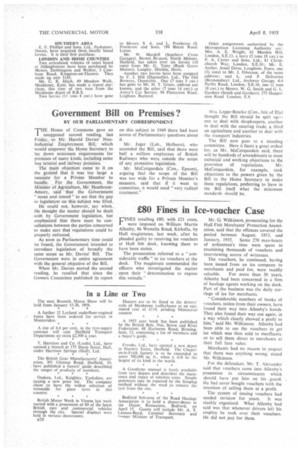£80 Fines in Ice-voucher Case
Page 54

If you've noticed an error in this article please click here to report it so we can fix it.
FINES totalling £80, with £21 costs, were imposed on William Martin Allenby, 86 Westella Road, Kirkella, by Hull magistrates, last week, after he pleaded guilty to receiving ice vouchers at Hull fish dock, knowing them to have been stolen.
The prosecution referred to a " considerable traffic" in ice vouchers at the dock. The magistrate commended the officers who investigated the matter upon their "determination to expose this swindle." Mr. G. Wilkinson, prosecuting for the Hull Fish Merchants' Protection Association, said that the offences covered the period between August, 1953, and January, 1955. Some 270 man-hours of policemen's time were spent in examining thousands of vouchers and interviewing scores of witnesses.
The vouchers, he continued, having been issued from an ice company to merchants and paid for, were readily saleable. For more than 30 years, Allenby had been concerned in a firm of haulage agents working on the dock. Part of the business was the daily carriage of ice for merchants.
"Considerable numbers of books of vouchers, stolen from their owners, have found their way into Allenby's hands. They also found their way out again, in a way which clearly showed a profit to him," said Mr. Wilkinson. Allenby had been able to use the vouchers to get ice which was then sold to merdhants, or to sell them direct to merchants at their full face value.
Merchants had no reason to suspect that there was anything wrong; stated Mr. Wilkinson.
For the defendant, Mr. T. Alexander said that vouchers came into Allenby's possession in circumstances which should have put him on his guard. He had never bought vouchers with the intention of selling them at a profit.
The system of issuing vouchers had needed revision for years. It was slackly organized. What Allenby had said was that whenever drivers left his employ he took over their vouchers. He did not pay for them.




























































































